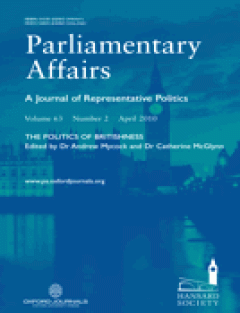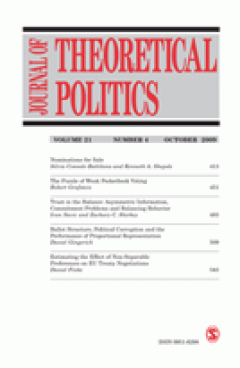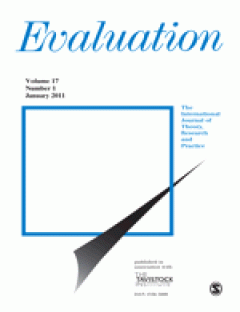Filter by

Diverse approaches to learning in rural and development studies : review of t…
In loosely structured environments such as rural areas, the objectives and methods to encourage knowledge creation and learning are still much debated, leading to a wide diversity of learning systems. Using action-learning theory as a standpoint from which to understand this diversity, a review of the literature was conducted and five specific approaches were identified: (1) extension, (2) comm…
- Edition
- Vol. 9, No. 2, June 2011,pp. 120–135
- ISBN/ISSN
- 14778238
- Collation
- -
- Series Title
- Knowledge Management Research & Practice
- Call Number
- -

Knowledge management governance – a strategic driver
This paper investigates how Knowledge management (KM) governance drives the effective implementation of KM strategy in organizations. To this end, we analysed the survey evidence from 218 organizations from the perspective of KM governance, selection of techniques in the development and implementation of knowledge strategy and its alignment with business strategy. Based on the analysis, we have…
- Edition
- Vol. 9, No. 2, June 2011, pp. 136–150
- ISBN/ISSN
- 14778238
- Collation
- -
- Series Title
- Knowledge Management Research & Practice
- Call Number
- -

The success of Expert Recommending Services and the part played by organizati…
Knowledge Management (KM) practice includes services designed to reduce the difficulty of sourcing knowledge, that is, getting the right knowledge to the right people at the right time. The phenomenon addressed in the study reported in this paper is a specific type of KM service – the Expert Recommending Service (ERS) – which contributes to achieving the difficult objective of getting the right…
- Edition
- Vol. 9, No. 2, June 2011,Pp. 151–171
- ISBN/ISSN
- 0037783X
- Collation
- -
- Series Title
- Knowledge Management Research & Practice
- Call Number
- -

Formulating integrated knowledge city development strategies : the KnowCis 2.…
During recent years, the theme of Knowledge Cities (KC) has evolved as a major topic of interest, in the context of the knowledge-based development (KBD) field. The KC theme, being multi-dimensional by nature, attracts researchers from a wide variety of disciplines. Many cities around the world are in the process of adopting KBD approaches and, specifically, of developing KC development strateg…
- Edition
- Vol. 9, No. 2, June 2011,Pp. 172–184
- ISBN/ISSN
- 0037783X
- Collation
- -
- Series Title
- Knowledge Management Research & Practice
- Call Number
- -

The KM processes in Malaysian SMEs : an empirical validation
This research attempts to investigate the degree of implementation of knowledge management (KM) processes in the small and medium enterprises (SMEs). The literature suggested that there are three general KM processes: construction, embodiment, and deployment. The processes are examined in detail which included the contributions of the KM process to enterprise performance. The data collected fro…
- Edition
- Vol. 9, No. 2, June 2011,pp. 185–196
- ISBN/ISSN
- 0037783X
- Collation
- -
- Series Title
- Knowledge Management Research & Practice
- Call Number
- -

Attitudes Towards Women in Politics : Gender, Generation and Party Identifica…
This article analyses the effects of gender, generation and party support towards a greater inclusion of women in politics in the Republic of Ireland and Northern Ireland. It explores attitudes on this issue using the same question in the Irish National Election Study and the Northern Ireland Life and Times Survey. The article documents a consistent gender gap in both polities that persists acr…
- Edition
- Vol. 64, No. 4, October 2011,pp. 585-611
- ISBN/ISSN
- 00312290
- Collation
- -
- Series Title
- Parliamentary Affairs
- Call Number
- -

‘Never Allow a Crisis Go To Waste’ : The Wright Committee Reforms to Stre…
In 2010 an important package of reforms was agreed to the British parliament, following a report by a new Select Committee on Reform of the House of Commons, chaired by Labour MP Tony Wright. The reforms changed the way in which select committee members and chairs are chosen, removing patronage powers from party whips and instead moving to a system of election. They also created a new category …
- Edition
- Vol. 64, No. 4, October 2011, pp. 612-633
- ISBN/ISSN
- 00312290
- Collation
- -
- Series Title
- Parliamentary Affairs
- Call Number
- -

Facing the Future ? David Owen and Social Democracy in the 1980s and Beyond
David Owen entered the House of Commons as member for Plymouth in 1966. He became a junior minister under Harold Wilson by 1968 and quickly established himself as a leading figure of the Labour right. From 1977 to 1979 he was Britain's youngest post-war Foreign Secretary under James Callaghan. In response to Labour's apparent leftward drift, Owen defected from the party in March 1981 to jointly…
- Edition
- Vol. 64, No. 4, October 2011,pp. 634-651
- ISBN/ISSN
- 00312290
- Collation
- -
- Series Title
- Parliamentary Affairs
- Call Number
- -

‘If a Charge was Brought Against a Saintly Religious Leader Whose Intention…
This article considers contemporary Parliamentary approaches to law-making in respect of homosexuality and religious belief through an analysis of debates regarding the creation of the offence of incitement to hatred on the grounds of sexual orientation (Section 74 and Schedule 16 of the Criminal Justice and Immigration Act 2008). By far the most contentious issue in debates about the legislati…
- Edition
- Vol. 64, No. 4, October 2011,pp, 652-673
- ISBN/ISSN
- 00312290
- Collation
- -
- Series Title
- Parliamentary Affairs
- Call Number
- -

Select Committees in the House of Commons and the Media
Previous studies examining the relationship between the media and the UK Parliament have emphasised a decline in the quantity and quality of media coverage of the House of Commons from the late 1980s onwards. However, such studies have focused primarily on the reporting of parliamentary debates in the Commons Chamber. Comparatively little attention has been paid to media coverage of select comm…
- Edition
- Vol. 64, No. 4, October 2011, pp. 694-713
- ISBN/ISSN
- 00312290
- Collation
- -
- Series Title
- Parliamentary Affairs
- Call Number
- -

‘Having it All?’ Women MPs and Motherhood in Germany and the UK
The increase in the number of women MPs in many countries in recent years suggests that it is easier for women to enter politics nowadays than used to be the case. However, this does not mean that it is a level-playing field once they get there. Women still have to contend with prejudice and discrimination, antiquated practices, an alien culture, and a routine and timetable far more suited to m…
- Edition
- Vol. 64, No. 4, October 2011,pp. 714-736
- ISBN/ISSN
- 00312290
- Collation
- -
- Series Title
- Parliamentary Affairs
- Call Number
- -

Paths to Power : The Making of Cabinet Ministers in Turkey
This article examines the trends in the political and social pathways to the cabinet in the modern Turkish Republic. It intends to fill the lacunae in the literature on Turkey's cabinets and ministerial elites in several respects. First, it examines the cabinets and the changes and/or continuities in their composition from 1923 until 2009, a period which has not been covered in its entirety by …
- Edition
- Vol. 64, No. 4, October 2011.pp. 737-762
- ISBN/ISSN
- 00312290
- Collation
- -
- Series Title
- Parliamentary Affairs
- Call Number
- -

Transforming the Future Parliament Through the Effective Use of Digital Media
This article explores research undertaken as part of the Hansard Society's Parliament 2020 project undertaken in the UK, Canada, Chile and Australia, looking at how new technologies can transform internal parliamentary processes and the relationships different legislatures have with the public. It discusses the findings of focus groups and interviews conducted with parliamentarians, parliamenta…
- Edition
- Vol. 64, No. 4, October 2011,pp. 781-792
- ISBN/ISSN
- 00312290
- Collation
- -
- Series Title
- Parliamentary Affairs
- Call Number
- -

Representing collective reasons for group decisions : The judgment aggregatio…
This article argues that the discursive dilemma and the judgement aggregation which causes it are based on a misconception of what it means for a group to give reasons for a democratic decision. Judgement aggregation analyses fail to distinguish between the procedure for determining such a decision, which should involve a vote of all group members, and the process for determining the reasons fo…
- Edition
- Vol. 23 no. 4, October 2011,pp. 448-462
- ISBN/ISSN
- 09516298
- Collation
- -
- Series Title
- Journal of Theoretical Politics
- Call Number
- -

The influence of strategic retirement on the incumbency advantage in US House…
Failure to take into account ‘strategic retirement’ leads to inflated estimates of the incumbent electoral advantage. The one attempt to address this issue in the context of US House elections implies that much of the supposed incumbency advantage and most of its presumed increase over time are illusory (Cox and Katz, 2002). This paper identifies possible problems with the Cox and Katz (2002) m…
- Edition
- Vol. 23 no. 4, October 2011,pp. 431-447
- ISBN/ISSN
- 09516298
- Collation
- -
- Series Title
- Journal of Theoretical Politics
- Call Number
- -

Pre-election polling and sequential elections
I consider a model in which the winner of a primary election faces a third candidate in a general election immediately thereafter. Prior to the primary election, there is a pre-election poll on how voters would vote in a hypothetical general election between one of the candidates in the primary election and the third candidate. I illustrate that voters have an incentive to misrepresent their vo…
- Edition
- Vol. 23 no. 4, October 2011,pp. 463-479
- ISBN/ISSN
- 09516298
- Collation
- -
- Series Title
- Journal of Theoretical Politics
- Call Number
- -

Jobs in politicians’ backyards : Party leadership competition and patronage
What are the factors that lead to variation in the clientelistic use of state resources in electoral contexts? In this article I provide one answer to this question by focusing on the role of intra-party politics and analyzing the empirical case of patronage jobs in the Argentine provinces between 1984 and 2001. Patronage jobs in provincial administrations help governors build political support…
- Edition
- Vol. 23 no. 4, October 2011,pp. 480-509
- ISBN/ISSN
- 09516298
- Collation
- -
- Series Title
- Journal of Theoretical Politics
- Call Number
- -

Unravelling Bueno De Mesquita’s group decision model
Political scientist Professor Bruce Bueno De Mesquita, has made significant claims for the predictive accuracy of his computational model of group decision making, receiving much popular press, including newspaper articles, books and a television documentary entitled ‘The New Nostradamus’. Despite these and many journal and conference publications related to the topic, no clear elucidation of t…
- Edition
- Vol. 23 no. 4, October 2011, pp. 510-531
- ISBN/ISSN
- 09516298
- Collation
- -
- Series Title
- Journal of Theoretical Politics
- Call Number
- -

The role of procedural commitment in informational theories of legislative or…
Contrary to codified procedures, almost all informational theories of legislative organization assume that the House floor commits to a special rule for floor consideration prior to a committee proposal. Employing Gilligan and Krehbiel’s (1989b) theoretical framework, we demonstrate that whether or not to assume this procedural commitment has a profound impact on our understanding of how the fl…
- Edition
- Vol. 23 no. 4, October 2011,pp. 532-558
- ISBN/ISSN
- 09516298
- Collation
- -
- Series Title
- Journal of Theoretical Politics
- Call Number
- -

The real functions of evaluation and response systems
This article is intended to contribute to the understanding of evaluation use in the context of policy making and governance. It does this, first, by developing a framework that sets out the prerequisites of six possible functions of an evaluation ‘management response system’; and second, by analysing three aid organizations’ management response systems in relation to this framework. The prereq…
- Edition
- Vol. 17 no. 4, October 2011,pp. 327-349
- ISBN/ISSN
- 09516298
- Collation
- -
- Series Title
- Evaluation
- Call Number
- -
 Computer Science, Information & General Works
Computer Science, Information & General Works  Philosophy & Psychology
Philosophy & Psychology  Religion
Religion  Social Sciences
Social Sciences  Language
Language  Pure Science
Pure Science  Applied Sciences
Applied Sciences  Art & Recreation
Art & Recreation  Literature
Literature  History & Geography
History & Geography